transcript
transcript
Psaki Defends Cap on Immigration Set by Trump Administration
The White House press secretary, Jen Psaki, defended the administration’s decision to cap the number of refugees allowed into the country. Ms. Psaki said the Biden administration planned to raise the cap by May 15.
-
Last week’s announcement or Friday’s announcement, I should say, was an effort, an important step forward in our view, to reverse the Trump policy that banned refugees from many key regions of the world. We we have every intention to increase the cap and to make an announcement of that by May 15 at the latest. And I expect it will be sooner than that. The president also remains committed to pursuing the aspirational goal of reaching 125,000 refugees by the end of the next fiscal year. We never said, we’re not raising the refugee cap. In the morning we said actually, and with the information we put out, was that once we reach 15,000, we will raise it. That was not accounted for, and some of, how people were — let me finish — some of how people were digesting the information, and we want it to be clear and send a message that we are a country that is welcoming refugees. Let’s be clear. We are changing the policies of the last administration. We are changing the policy of not welcoming in people from Africa or people from the Middle East. That was the biggest factor, preventing refugees from coming in during the last administration. The battle is not the cap. The issue has been the limitations that have been put in place in the past. We overturned those and changed those, and it was always meant to be a first step.

Jen Psaki, the White House press secretary, on Monday defended the administration’s decision to keep the number of refugees allowed into the country at the level set by the Trump administration, a move last week that prompted immediate criticism by Democrats and an about-face by President Biden.
Ms. Psaki said the Biden administration was still trying to figure out how to process more refugees and plans to raise the cap by May 15.
“The challenge is not the cap,” Ms. Psaki said while fielding questions from reporters on the issue for several minutes. “The challenge is the ability to process.”
The Biden administration for months has promised to raise the refugee ceiling. In his first foreign policy speech, on Feb. 4, Mr. Biden said he would raise the limit from 15,000 to 125,000 for the 2022 fiscal year. Later that month, Secretary of State Antony J. Blinken notified Congress that the administration would allow up to 62,500 refugees into the United States for the rest of the fiscal year ending Sept. 30. The administration said at the time that “grave humanitarian concerns” around the world justified raising the cap earlier than usual.
But on Friday, the White House left the cap at 15,000. Mr. Biden did make some changes, such as scrapping a Trump-era classification system in the refugee program that restricted the number of African and Muslims who could secure refuge to the United States.
Still, the news drew immediate criticism and within hours, the White House promised to announce a final, increased number by May 15.
“The admission of up to 15,000 refugees remains justified by humanitarian concerns and is otherwise in the national interest,” Mr. Biden wrote in an executive memorandum released Friday. Ms. Psaki said on Monday that the order also said that the cap could be increased in the future.
Asked on Monday whether administration officials should have assessed whether or not they would have the capacity to accommodate a large number of refugees before beginning to make announcements about raising the refugee cap, Ms. Psaki bristled, saying, “People weren’t understanding what we were conveying to the public. We were conveying what we were trying to project to countries around the world.”
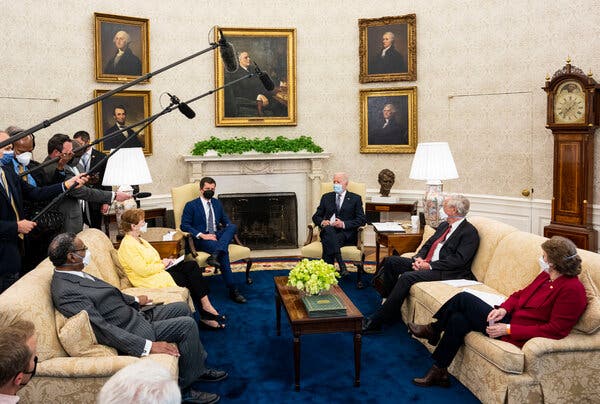
President Biden met with a bipartisan group of lawmakers at the White House on Monday in an effort to win support for his proposal to overhaul the nation’s aging infrastructure.
“I am prepared to compromise,” Mr. Biden said in the Oval Office at the start of the meeting. He said the discussion would focus on what to include in the bill and how to pay for it, adding, “It’s a big package, but there are a lot of needs.”
The group included two Republican senators, Mitt Romney of Utah and John Hoeven of North Dakota; two Democratic senators, John Hickenlooper of Colorado and Jeanne Shaheen of New Hampshire; and one independent senator, Angus King of Maine, who caucuses with Democrats. It also included Representatives Kay Granger of Texas and Carlos Giménez of Florida, who are Republicans, and Representatives Emanuel Cleaver II of Missouri, Charlie Crist of Florida and Norma J. Torres of California, who are Democrats.
In an interview, Ms. Torres said that each of the attendees had outlined their priorities and suggestions as Congress works to fill in the details of Mr. Biden’s $2.3 trillion proposal. She said her focuses had been transportation equity, using American materials and workers to improve infrastructure, and repealing a cap on state and local tax deductions.
Ms. Torres said the president had indicated that he “wants us to work on a plan that we can support,” adding that the sentiment appeared to be directed toward Republicans, who have raised a broad range of concerns.
The president has repeatedly said he would prefer a bipartisan deal. But White House officials and other Democrats have also made clear that they are willing to push through a bill on a party-line vote. Republicans, who have criticized the proposal’s size, scope and reliance on tax increases, have warned that Mr. Biden needs to prove he is genuinely interested in their input, particularly after Democrats passed his $1.9 trillion pandemic relief plan alone despite bipartisan talks.
In an interview, Mr. Giménez said he believed that “everybody put their cards on the table.”
“There’s wide disagreement on what infrastructure is, and the amount of money that should be spent on a bill of this nature,” he said, adding that Mr. Biden had raised the possibility of Republicans’ bringing a counterproposal by mid-May for him to consider.
Mr. Romney said he believed Mr. Biden’s interest was sincere.
“He was in listening mode and was gracious to solicit our respective points of view,” he said. “I think they would like to work on a bipartisan basis. I think there’s a great deal of interest on the part of Republicans to improve our infrastructure, and the challenge is going to be how it’s paid for.”
Mr. Romney said he had raised the possibility of letting state and local governments use money from the pandemic relief package to pay for infrastructure projects.
The yawning gap between the size of Mr. Biden’s plan and what Republicans might support is only one indication of the difficulties ahead in Congress. While Republicans have pushed for a smaller, more focused plan, progressives are pressing Mr. Biden to go even bigger: They unveiled legislation Monday laying out markers on public housing and renewable energy.
Democratic leaders have not settled on a legislative strategy to pass Mr. Biden’s plan. They are exploring the possibility of using a fast-track budget reconciliation process to bypass Republican objections and the 60-vote filibuster threshold in the Senate. If they go that route, every Senate Democrat would need to remain on board.
Before Monday, Mr. Biden had already hosted two similar bipartisan meetings, as well as sessions with the Congressional Black Caucus and the Congressional Asian Pacific American Caucus. He invited former mayors and governors serving in Congress for Monday’s meeting, White House officials said, because of their experience confronting infrastructure issues in their communities.
transcript
transcript
Harris Says Biden’s Infrastructure Plan Will Create ‘Good Jobs’
Vice President Kamala Harris visited North Carolina on Monday to promote President Biden’s infrastructure plan, saying it will create “good jobs.”
-
In the 21st century in America, I believe you should not have to work more than one job to be able to pay your bills and feed your family. [applause] One good job should be enough. At a good job, you shouldn’t have to worry about your safety, you shouldn’t have to worry about whether you have the ability to get a good life because you might have to go in debt for a diploma that promises a decent paycheck. It’s pretty simple. A good job allows people the freedom to build the life you want, to reach as high as you want, to aspire. That’s what a good job does. And good jobs are what the president and I will create with the American Jobs Plan. We will draw on the skills that millions of workers in our country already have. We can’t just talk about higher education without thinking about what kind of training Americans need to get hired — instead of simply framing it as higher education, let’s create a variety of opportunities for education after high school.
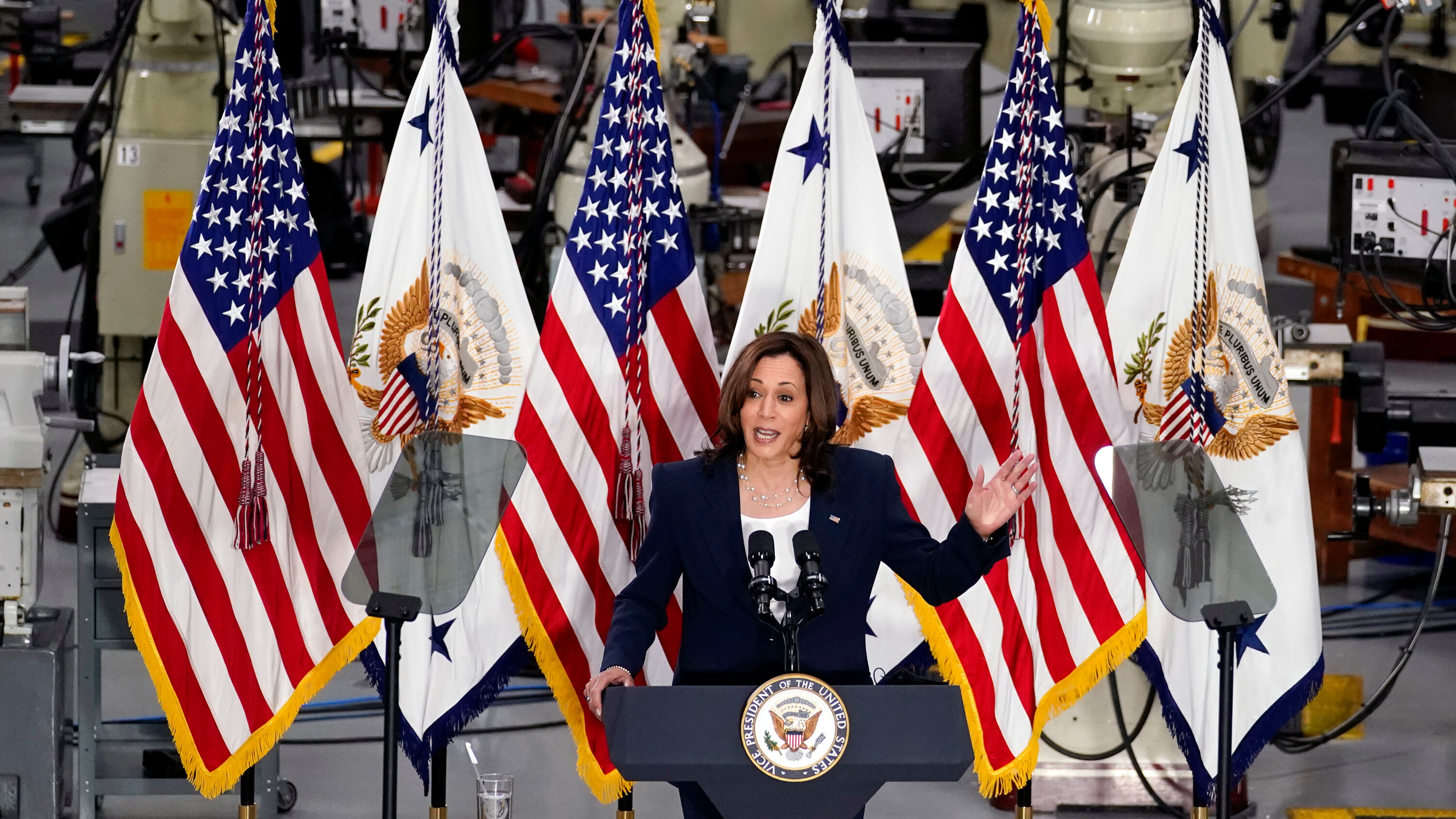
Vice President Kamala Harris traveled to North Carolina on Monday to promote the Biden administration’s $20 billion proposal to convert the country’s entire fleet of gasoline- and diesel-powered school buses to electric vehicles, and to talk up the president’s plans to create “good jobs.”
The speech was expected to help position Ms. Harris as one of the main faces advocating the American Jobs Plan, which so far has been handled mostly by five cabinet secretaries tasked with selling President Biden’s $2 trillion infrastructure proposal. Administration officials said she would travel the country in the coming weeks to continue promoting the plan.
Speaking at Guilford Technical Community College, Ms. Harris talked about how the administration’s infrastructure plans would create “good jobs,” a notable shift away from attempts by other officials to provide specific metrics about how many jobs the plan would create.
“I believe you shouldn’t have to work more than one job to pay your bills and feed your family,” she said. “One good job should be enough.”
Ms. Harris said only that the administration’s plan would create “millions of jobs” and that “a majority of the jobs we will create through the American jobs plan will require at most six months of training after high school.”
Ms. Harris’s focus on the quality of the jobs that would be created, rather than a specific number, reflected the administration’s new approach as it tries to sell a plan that still has no Republican support in Congress.
Mr. Biden and Pete Buttigieg, the transportation secretary, have both claimed inaccurately that the plan would add 19 million jobs to the U.S. economy. But the analysis by Moody’s Analytics that they referred to included 16.3 million jobs that were projected to be added even if the proposal never passed. Since then, the administration has shifted its focus to talking more generally about “good jobs” rather than a target number.
As the administration approaches 100 days in office, Ms. Harris, the first Black woman to be vice president, still appears to be figuring out how she wants to function in a historically frustrating role.
Her portfolio also includes leading a diplomatic effort with Mexico and Central American countries to address the root causes of migration as well as the crisis at the border. That task offers Ms. Harris an opportunity and a risk: If she appears to take on a hard problem and make progress, she would impress critics who do not see her as a policy heavyweight in the White House. But it also puts her at the forefront of one of the most difficult issues before the administration.
For now, her appearances are mostly tied to policies she championed as a senator. Her speech on Monday followed an appearance last month in Oakland, Calif., where she visited a water treatment plant and underscored the infrastructure plan’s $45 billion in funding to eliminate all lead service lines and to reduce lead exposure in 400,000 schools and child care centers.
As a senator, Ms. Harris introduced the Water Justice Act, which included emergency funds for communities and schools to test for and remediate or replace toxic infrastructure for drinking water. And she introduced the Clean School Bus Act to assist school districts in replacing diesel school buses with electric buses, her aides said.

As President Biden prepares to convene heads of state on Thursday and Friday for a virtual summit to declare that the United States is ready to reclaim a leadership role in fighting climate change, he faces a fundamental question: Is America’s word still any good?
The question is dogging Mr. Biden as he tries to reassert the American role in other parts of the world stage after four years of Donald J. Trump’s America First isolationism.
Perhaps nowhere is the skepticism about U.S. credibility as consequential as on the issue of climate change.
transcript
transcript
Merrick Garland Honors Victims of the Oklahoma City Bombing
Attorney General Merrick B. Garland commemorated the 26th anniversary of the Oklahoma City bombing on Monday, vowing to combat domestic extremism. Mr. Garland led the investigation into the 1995 attack on the Alfred P. Murrah Federal Building as a young Justice Department official.
-
Every year on the 19th of April, people gather here at this beautiful memorial to remember those who were killed, those who survived and those who were changed forever. Those who do not first know firsthand about the bombing of the Murrah Federal Building can understand and learn of the tragedy. We tell and retell the story to instill in them the commitment to prevent tragedies like this from occurring again. And this memorial is a monument to a community that will not allow hate and division to win. The Department of Justice is pouring its resources into stopping domestic violent extremists before they can attack, and prosecuting those who do and battling the spread of the kind of hate that leads to tragedies like the one we mark today. We must all stand together against them for the safety of our communities, and for the good of our country.
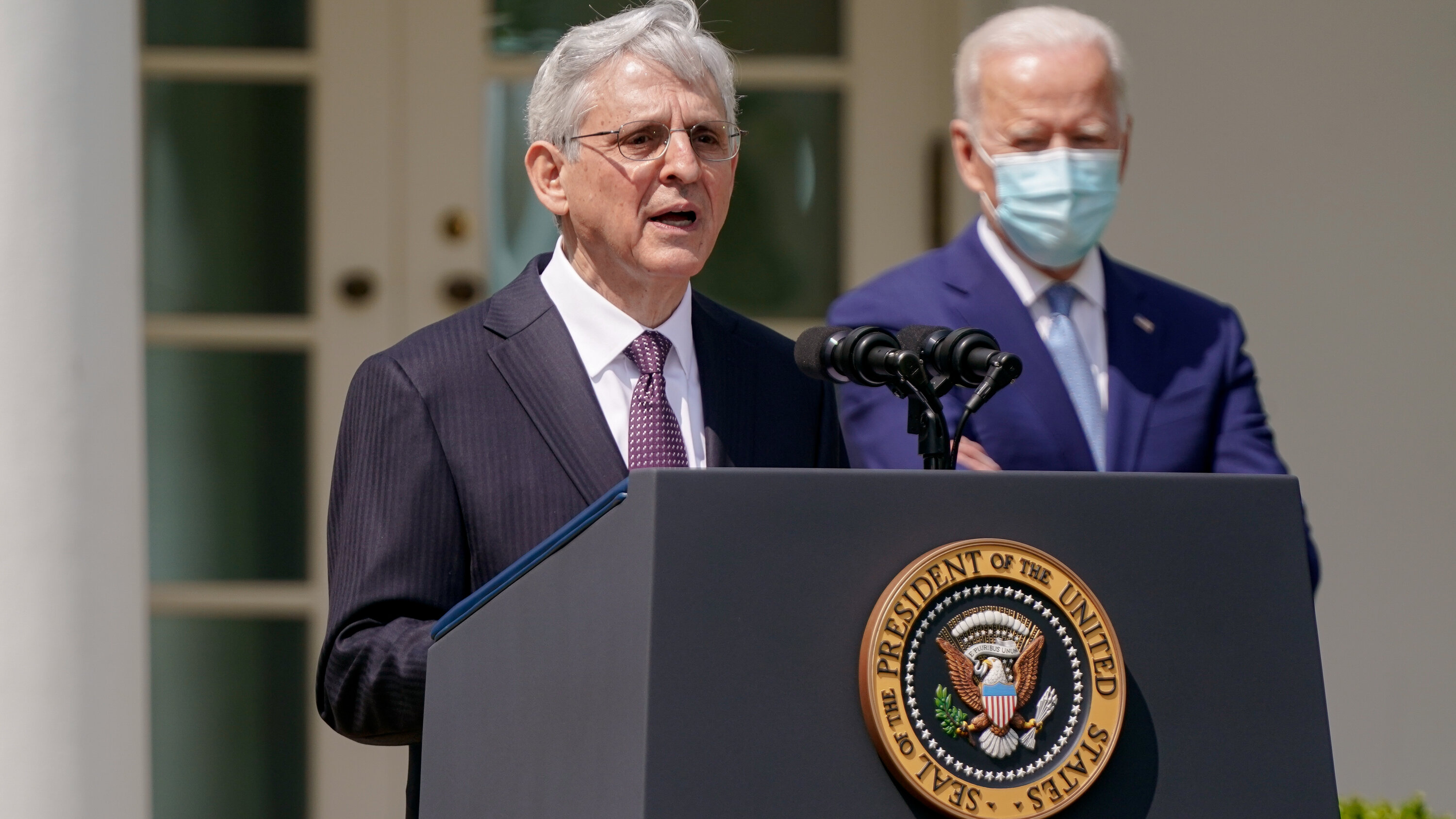
Attorney General Merrick B. Garland said on Monday that the Justice Department was pouring resources into its effort to stop domestic violent extremists and that those who attacked the United States would be brought to justice, in a speech commemorating the 26th anniversary of the Oklahoma City bombing.
As a young Justice Department official, Mr. Garland led the investigation into the 1995 attack on the Alfred P. Murrah Federal Building, the worst domestic terror attack in American history. Timothy J. McVeigh, an Army veteran who hoped to use violence to spark an anti-government revolution, was ultimately convicted of using a massive truck bomb to destroy the federal building and kill 168 people, including 19 children.
“Although many years have passed, the terror perpetrated by people like Timothy McVeigh is still with us,” Mr. Garland said. “The Department of Justice is pouring its resources into stopping domestic violent extremists before they can attack, prosecuting those who do, and battling the spread of the kind of hate that leads to tragedies like the one we mark here today.”
Mr. Garland’s trip to Oklahoma also included a visit to a memorial in Tulsa for the 1921 race riot in the city that killed as many as 300 people and burned down more than 1,200 homes in one of the worst acts of racial violence in American history.
In an interview with ABC News, Mr. Garland called the Tulsa riot “the product of the same kind of hatred that led to the bombing in Oklahoma City,” and said both were “brought by terrible hatred.”
Mr. Garland made his public comments as the Biden administration’s works to combat domestic extremism in the wake of the deadly Jan. 6 attack on the Capitol by a pro-Trump mob that included members of anti-government militias and other right-wing extremist groups.
An intelligence report delivered to Congress last month warned that extremist groups pose a rising threat, with extremists who are motivated by race more likely to attack civilians, and members of anti-government militias more likely to target law enforcement and government buildings and employees.
The Justice Department’s sprawling investigation into the Jan. 6 attack represents the administration’s most visible effort to combat domestic extremism.
That effort gained ground on Friday, when Jon Ryan Schaffer, a member of the Oath Keepers militia who was charged in connection with the assault, pleaded guilty and agreed to cooperate with the government’s efforts to pursue charges against other assailants.
Mr. Garland also told ABC News that “we do not yet have equal justice under law” in America, and that it is “an important part of the role of the Justice Department to help bring it about.”
His comments were broadcast hours after lawyers delivered closing arguments in the murder trial of Derek Chauvin, a white Minneapolis police officer accused in the death last year of a Black man, George Floyd, that fueled nationwide racial justice protests and civil unrest.
“Racism is an American problem,” Mr. Garland said. “It’s plain to me that there has been and remains discrimination against African Americans and other communities of color, and other ethnic minorities. I think it’s reflected in discrimination in housing and employment and the justice system.”
He vowed to “use every resource we have available to ensure that equal justice occurs.”

Capitol Police Officer Brian D. Sicknick had multiple strokes hours after sparring with a pro-Trump mob during the Jan. 6 riot and died of natural causes, Washington’s medical examiner said on Monday.
The determination likely complicates the Justice Department’s efforts to prosecute anyone in the death of Mr. Sicknick, 42; two men have been charged with assaulting him by spraying an unknown chemical on him outside the Capitol.
But the autopsy found no evidence that Officer Sicknick had an allergic reaction to chemicals nor of any internal or external injuries, the medical examiner, Dr. Francisco J. Diaz, told The Washington Post, which first reported his finding.
Still, Dr. Diaz added of the riot, “All that transpired played a role in his condition.”
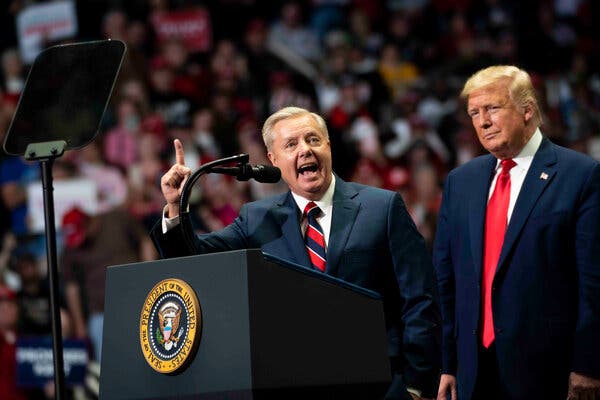
Former President Donald J. Trump is headlining a fund-raiser next month with Senator Lindsey Graham of South Carolina, his on-again, off-again ally, at one of Mr. Trump’s golf properties in Florida. The proceeds will be split among political committees tied to Mr. Graham, Mr. Trump’s new political action committee and the campaign arm of Senate Republicans.
The invitation for the $25,000 golfing fund-raiser, billed as the “Trump Graham Golf Classic,” was first posted by Punchbowl News.
Mr. Trump has had a rocky relationship with Senate Republicans — including Mr. Graham — since the riot at the Capitol in January, which led to his second impeachment.
The day after the riot, Mr. Graham declared that his relationship with Mr. Trump was over — “All I can say is, count me out. Enough is enough,” he said — only to quickly make amends.
Senator Mitch McConnell, Republican of Kentucky and the minority leader, voted to acquit Mr. Trump during his impeachment trial but condemned his actions leading up to the riot.
Mr. Trump, in turn, called Mr. McConnell a “a stone-cold loser” (among other things) at a fund-raiser for the Republican National Committee this month at Mar-a-Lago, Mr. Trump’s private club. Earlier that weekend, the chairman of the National Republican Senatorial Committee, Senator Rick Scott of Florida, had handed Mr. Trump a small silver bowl that represented the inaugural “Champion of Freedom” award.
The N.R.S.C. is one of the beneficiaries of the golf tournament.
A number of ambitious Republicans have trekked to Mar-a-Lago both to seek Mr. Trump’s support and to hold fund-raisers at a venue where the former president personally benefits financially. Mr. Trump, for instance, stopped by an event for his former White House press secretary Sarah Huckabee Sanders, who is running for governor of Arkansas, this month.
Representative Billy Long, Republican of Missouri, is holding a fund-raiser at Mar-a-Lago on April 28. Mr. Long is considered a potential candidate for the Senate. Another Missouri Republican considering a Senate bid, Representative Jason Smith, has a fund-raiser scheduled at the Florida resort days later.

The United States military will begin offering to vaccinate the detainees at Guantánamo Bay on Monday in an effort to protect troops stationed there and help restart the stalled war crimes hearings, an administration official with knowledge of the Pentagon plan said.
The U.S. Southern Command, which has oversight of the prison, sought permission during the Trump administration to vaccinate the detainees, who include Khalid Shaikh Mohammed and four other men accused of conspiring to carry out the attacks of Sept. 11, 2001. A memo dated Dec. 23 described the detainees as “a high-risk community,” and invoked both “the Geneva Convention and Department of Defense guidance.”
But the Pentagon postponed plans to start the vaccinations on Feb. 1, after elected officials and victims of the attacks accused the Defense Department of putting terrorism suspects ahead of the American people, who were only just starting to get access to the vaccines in substantial numbers then.
By Monday, the official said, all of the adults at the remote base in Cuba had been offered a vaccine, including the troops and civilian Defense Department employees — 1,500 in all — who work at the detention operation. An undisclosed number of staff members at the prison had declined.
The vaccines are not mandatory for the military or civilian Defense Department employees.
The administration official said the decision to vaccinate the detainees was intended in part to protect those service members who had declined to be vaccinated. As of Monday, all adults in every U.S. state, Washington, D.C., and Puerto Rico are now eligible for a Covid-19 vaccine, meeting the April 19 deadline that President Biden set two weeks ago.

A new study, to be published in The North Carolina Law Review, documents a broad trend of Supreme Court justices holding negative views of the news media.
The study tracked every reference to the news media in the justices’ opinions since 1784 and found “a marked and previously undocumented uptick in negative depictions of the press by the U.S. Supreme Court.”
The study was not limited to cases concerning First Amendment rights. It took account of “all references to the press in its journalistic role, to the performance of commonly understood press functions or to the right of press freedom.” Many of these references were in passing comments in decisions on matters as varied as antitrust or criminal law.
“A generation ago, the court actively taught the public that the press was a check on government, a trustworthy source of accurate coverage, an entity to be specially protected from regulation and an institution with specific constitutional freedoms,” wrote the study’s authors, RonNell Andersen Jones, a law professor at the University of Utah, and Sonja R. West, a law professor at the University of Georgia.
“Today, in contrast, it almost never speaks of the press, press freedom or press functions, and when it does, it is in an overwhelmingly less positive manner.”
There may be many reasons for the shift documented in the study beyond a change in judicial attitudes. The news media may have become less trustworthy and more ideologically skewed. It has certainly become more various and harder to define. And it has been the subject of relentless attack from politicians, notably former President Donald J. Trump.
“Some shift might be expected,” Professor Jones said in an interview. “But the uniformity and degree of it was pretty staggering.”
The study found that conservative justices have always been more apt to write negative things about the press. The new development is that liberal justices now have little good to say about it.
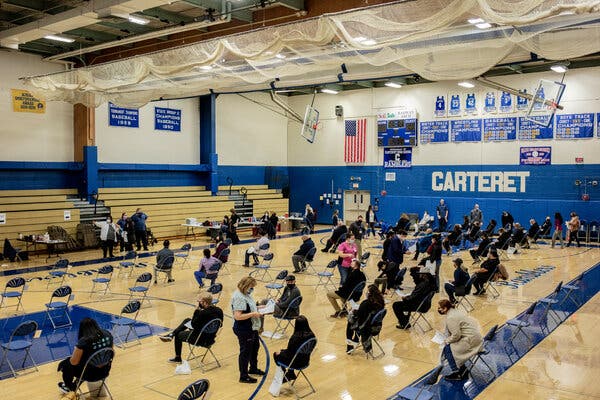
All adults in every U.S. state, Washington, D.C., and Puerto Rico are now eligible for a Covid-19 vaccine, meeting the April 19 deadline that President Biden set two weeks ago.
“For months I’ve been telling Americans to get vaccinated when it’s your turn. Well, it’s your turn, now,” Mr. Biden said Sunday on a program called “Roll Up Your Sleeves” on NBC. “It’s free. It’s convenient and it’s the most important thing you can do to protect yourself from Covid-19.”
The United States is administering an average of 3.2 million doses a day, up from roughly 2.5 million a month before. More than 131 million people, or half of all American adults, had received at least one shot as of Sunday, according to the Centers for Disease Control and Prevention, and about 84.3 million people have been fully vaccinated.
Hawaii, Massachusetts, New Jersey, Oregon, Rhode Island and Vermont were the last states to expand eligibility, opening vaccinations to all adults on Monday.
“It’s truly historic that we have already reached this milestone,” said Dr. Nandita Mani, the associate medical director of infection prevention and control at the University of Washington Medical Center.
After a slow start, the pace of vaccinations has risen considerably in recent months. Mr. Biden, who initially said he wanted states to make all adults eligible for a vaccine by May 1, moved the deadline up as vaccinations accelerated. Mr. Biden has also set a goal of administering 200 million doses by his 100th day in office, which the nation is on pace to meet.
The expansion of eligibility comes as medical officials investigate whether Johnson & Johnson’s one-shot Covid-19 vaccine is linked to a rare blood-clotting disorder. All 50 states suspended administration of the vaccine last week, after federal health officials recommended a pause.
Dr. Anthony S. Fauci, the nation’s leading infectious disease expert, said on Sunday that federal regulators should come to a decision on Friday about whether to resume Johnson & Johnson vaccinations. Although he said he did not want to get ahead of the C.D.C. and the Food and Drug Administration, he said he expected experts to recommend “some sort of either warning or restriction” on the use of the vaccine.
Even if there is a link between the vaccine and the clotting disorder, the risk is exceedingly low, experts say.
Still, Dr. Mani said the pause was likely to harden the hesitancy of some Americans to get vaccinated.
At the same time, with the virus resurgent, public health experts are warning Americans not to let their guards down. The United States is averaging more than 67,000 new cases a day over the past seven days, up from over 54,000 a month ago, according to a New York Times database.
“Seventy thousand cases a day is not acceptable. We have to get that down,” said Barry Bloom, a research professor and former dean of the Harvard T.H. Chan School of Public Health. He said more vaccinations would help, but people must remain vigilant about wearing masks and social distancing.
At its current pace, the United States will vaccinate 70 percent of its population by mid-June. But vaccine hesitancy could slow progress toward herd immunity, which will also depend on vaccinating children.
“We’re making tremendous progress, but we’re still in the race against this virus, and we need to vaccinate tens of millions more Americans,” Mr. Biden said on Sunday. “We could have a safe and happy Fourth of July with your family and friends in small groups in your backyard. That’s going to take everyone doing their part. Get vaccinated.”
Pfizer announced this month that it had applied for an emergency use authorization to make children ages 12 to 15 eligible for its vaccine. Moderna is expected to release results from its trial in young teenagers soon, and vaccinations in this age group could begin before school starts in the fall.
Trials in younger children are underway. Dr. Fauci also said on Sunday that he expected children of all ages to be eligible for vaccination in the first quarter of 2022.
Although vaccinations have picked up in the United States, many countries still face dire vaccine shortages. About 83 percent of Covid-19 vaccinations have been administered in high- and upper-middle-income countries, while only 0.2 percent of doses have been administered in low-income countries, according to a New York Times vaccine tracker.
Dr. Funmi Olopade, the director of the Center for Global Health at the University of Chicago, said it was crucial for the United States to step up its role in the global vaccination campaign as supply increases. The virus, left to spread around the world, could continue to mutate and threaten the nation’s economic recovery, she said.
It is in everybody’s “self-interest to provide whatever we can in the way of excess vaccines to low- and middle-income countries,” Dr. Bloom said.
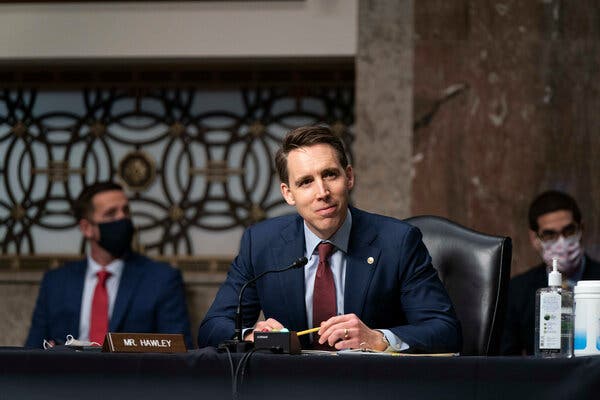
Republicans who were the most vocal in urging their followers to come to Washington on Jan. 6 to try to reverse President Donald J. Trump’s loss, pushing to overturn the election and stoking the grievances that prompted the deadly Capitol riot, have profited handsomely in its aftermath, according to new campaign data.
Senators Josh Hawley of Missouri and Ted Cruz of Texas, who led the challenges to President Biden’s victory in their chamber, each brought in more than $3 million in campaign donations in the three months that followed the Jan. 6 attack on the Capitol.
Representative Marjorie Taylor Greene, Republican of Georgia who called the rampage a “1776 moment” and was later stripped of committee assignments for espousing bigoted conspiracy theories and endorsing political violence, raised $3.2 million — more than the individual campaign of Representative Kevin McCarthy, the minority leader, and nearly every other member of House leadership.
A New York Times analysis of the latest Federal Election Commission disclosures illustrates how the leaders of the effort to overturn Mr. Biden’s electoral victory have capitalized on the outrage of their supporters to collect huge sums of campaign cash. Far from being punished for encouraging the protest that turned lethal, they have thrived in a system that often rewards the loudest and most extreme voices, using the fury around the riot to build their political brands. The analysis examined the individual campaign accounts of lawmakers, not joint fund-raising committees or leadership political action committees.
“The outrage machine is powerful at inducing political contributions,” said Carlos Curbelo, a former Republican congressman from Florida.
Shortly after the storming of the Capitol, some prominent corporations and political action committees vowed to cut off support for the Republicans who had fanned the flames of anger and conspiracy that resulted in violence. Only a handful of corporate political action committees gave to the Republican objectors in the first three months of the year. But any financial blowback from corporate America appears to have been dwarfed by a flood of cash from other quarters.
Representative Madison Cawthorn of North Carolina, a freshman who urged his supporters to “lightly threaten” Republican lawmakers to goad them into challenging the election results, pulled in more than $1 million. Representative Lauren Boebert of Colorado — who like Ms. Greene compared Jan. 6 to the American Revolution — took in nearly $750,000.
The sums reflect an emerging incentive structure in Washington, where the biggest provocateurs can parlay their notoriety into small-donor successes that can help them amass an even higher profile. It also illustrates the appetites of a Republican base of voters who have bought into Mr. Trump’s false claims of widespread election fraud and are eager to reward those who worked to undermine the outcome of a free and fair election.
Lauren Hirsch and Jeanna Smialek contributed reporting.

A new poll may put some wind in the actor Matthew McConaughey’s sails as he considers whether to run for governor of Texas.
Forty-five percent of the state’s voters said that they would vote for Mr. McConaughey if he were to challenge Gov. Greg Abbott next year, according to the poll, conducted by The Dallas Morning News and the University of Texas, Tyler.
An additional 33 percent of voters said they would support the incumbent, while 22 percent said that at this early stage, they would prefer to choose someone else.
But such highly theoretical questions can sometimes produce wonky results, especially this far in advance of any actual campaigning. That’s doubly true when the hypothetical involves a figure with name recognition as high as Mr. McConaughey’s, particularly in his home state.
The actor has repeatedly flirted with running for governor, though he has not said whether he would run as a Republican or a Democrat. Last month he said he was seriously considering a bid.
“I’m looking into now again, what is my leadership role?” he said on a podcast. “Because I do think I have some things to teach and share, and what is my role? What’s my category in my next chapter of life that I’m going into?”
His fortunes in the new poll were particularly good among independents, 44 percent of whom said they’d support him and only 18 percent of whom said they would back the governor, a Republican.
Yet Mr. Abbott’s job approval rating was healthy, with 50 percent of voters giving him positive marks and 36 percent negative. Fifty-four percent said he had responded well to the state’s power failure crisis, driven by strong support from Republicans; independents tilted away from him here, with 50 percent saying he had handled it badly and 43 percent saying he responded well, the poll found.
The survey was conducted from April 6-13 among 1,126 registered Texas voters, using a mixed-mode approach that included live phone interviews as well as online polling through the Dynata database.
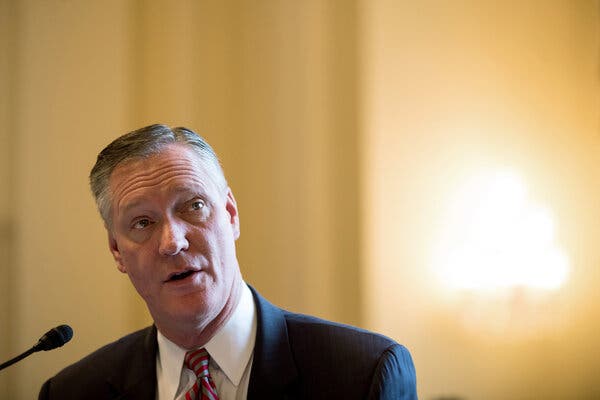
Representative Steve Stivers of Ohio, who led the House Republicans’ campaign arm in 2018 and more recently nudged the party to move past former President Donald J. Trump, said on Monday that he planned to resign and take a job in the private sector next month.
Mr. Stivers, 56, had been exploring a run for Senate in 2022, telephoning donors and presenting himself as a possible alternative to candidates representing the pro-Trump wing of the party. But on Monday, he said he would be leaving the House on May 16 instead, to become the president and chief executive of the Ohio Chamber of Commerce.
“Throughout my career, I’ve worked to promote policies that drive our economy forward, get folks to work, and put our fiscal house in order,” he wrote on Twitter. “I’m excited to announce that I will be taking on a new opportunity that allows me to continue to do that.”
The retirement will give a brief boost to Democrats, cushioning their exceedingly narrow majority in the House until Ohio can hold a special election to fill the seat. His Columbus-area district is considered reliably Republican and is likely to stay in G.O.P. hands in a special election.
A business-minded Republican, Mr. Stivers once represented the mainstream of the party’s delegations in Congress. He was an ally of Speaker Paul D. Ryan and chosen to lead the National Republican Congressional Committee during the 2018 midterm elections, when a wave of antipathy toward Mr. Trump cost Republicans their House majority.
But as the House has moved decisively toward Mr. Trump and his pugilistic style of politics in recent years, he has at times looked out of step with colleagues who continue to embrace the former president, and his departure continues a fast-paced turnover the party has experienced in Mr. Trump’s shadow.
Mr. Stivers voted against impeaching Mr. Trump in January after the attack on the Capitol, but he said that Mr. Trump’s attempts to overturn the election results were “unacceptable and contributed to what will be remembered as one of the darkest days in our nation’s history.” In interviews, Mr. Stivers said he hoped Mr. Trump would “step aside” like other former presidents who have “had their time in the sun.”
Jonathan Martin contributed reporting.
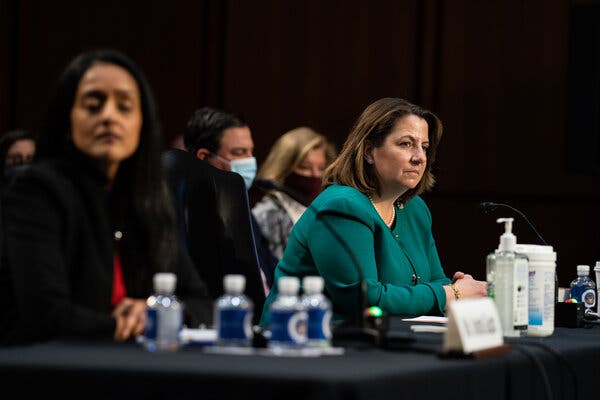
Lisa Monaco was President Barack Obama’s top counterterrorism adviser when she was handed an intractable problem: Fix the administration’s ineffective response to the kidnappings of Americans by Islamic State fighters, which had prompted outcries from victims’ families, without changing the government’s refusal to make concessions to terrorists.
Ms. Monaco quickly instituted a change, according to Matthew Olsen, a former director of the National Counterterrorism Center. She mandated that the families, who had been kept in the dark about the government’s restrictions and had even faced threats of prosecution should they pay ransoms themselves, be brought into the fold. Most had lost faith in the government, and she sought them out to ensure that a new hostage policy was fair and credible.
“For the administration to realize it was not handling this right was a lot to Lisa’s credit,” said Diane Foley, whose son James Foley was the first American to be beheaded by the Islamic State in 2014. After Ms. Monaco’s team completed its review, the administration adopted a policy that included advising families of all their options and refraining from threats of prosecution. Mr. Obama acknowledged that the government should have treated them as “trusted partners.”
Now Ms. Monaco, 53, a veteran of national security roles, is poised to become the deputy attorney general — the Justice Department’s No. 2 official — where her ability to broker consensus on politically charged issues will quickly be tested. Among other matters, she is expected to be a key player in the Biden administration’s push to combat domestic extremism, embodied most publicly in the Justice Department’s investigation into the deadly Capitol attack on Jan. 6 by a pro-Trump mob.
Her experience with cyberissues will help give her office an influential voice as the Biden administration confronts threats from countries like Russia, which it penalized on Thursday for hacking American government agencies and companies and for interfering in the 2020 presidential election.
Ms. Monaco will also work closely with Attorney General Merrick B. Garland to rebuild trust in the Justice Department after it became a target of President Donald J. Trump and his allies.
Her résumé makes her uniquely suited to tackle the department’s biggest issues, which include not only domestic extremism but also foreign cyberattacks, a sensitive investigation into Mr. Biden’s son and an open special inquiry into the roots of the Russia investigation.
Ms. Monaco is also known for being careful to build support for her views. “Good ideas die all the time because people don’t go to the right congressman or cabinet secretary and get buy-in,” said Ken Wainstein, who was Ms. Monaco’s predecessor as the head of the Justice Department’s national security division. “That’s the kind of thing that Lisa is masterful at.”
The Senate Judiciary Committee voiced unanimous support for her nomination last month and a bipartisan coalition of senators is expected to confirm her in the coming days.

Here come the lobbyists.
The cryptocurrency exchange Coinbase, the asset manager Fidelity, the payments company Square and the investment firm Paradigm have established a new trade group in Washington: The Crypto Council for Innovation. The group hopes to influence policies that will be critical for expanding the use of cryptocurrencies in conjunction with traditional finance, Ephrat Livni reports in the DealBook newsletter.
Cryptocurrencies are still mostly held as speculative assets, but some experts believe Bitcoin and related blockchain technologies will become fundamental parts of the financial system, and the success of businesses built around the technology may also invite more attention from regulators.
“We’re going to increasingly be having scrutiny about what we’re doing,” Brian Armstrong, Coinbase’s chief executive, said on CNBC. “We’re very excited and happy to play by the rules,” he added, but regulation of crypto should be on a “level playing field with traditional financial services.”
Here are four of the issues that will keep crypto lobbyists busy:
-
The Crypto Council’s first commissioned publication is an analysis of Bitcoin’s illicit use, and it concludes that concerns are “significantly overstated” and that blockchain technology could be better used by law enforcement to stop crime and collect intelligence.
-
New anti-money-laundering rules passed this year will significantly expand disclosures for digital currencies. The Treasury Department has also proposed rules that would require detailed reporting for transactions over $3,000 involving “unhosted wallets,” or digital wallets that are not associated with a third-party financial institution, and require institutions handling cryptocurrencies to process more data.
-
When is a digital asset a security and when is it a commodity? Bitcoin and other cryptocurrencies that are released via a decentralized network generally qualify as commodities and are less heavily regulated than securities, which represent a stake in a venture. Tokens released by people and companies are more likely to be characterized as securities because they more often represent a stake in the issuer’s project.
-
The Chinese government is already experimenting with a central bank digital currency, a digital yuan. China would be the first country to create a virtual currency, but many are considering it. Some crypto advocates worry that China’s alacrity in the space threatens the dollar, national security and American competitiveness.
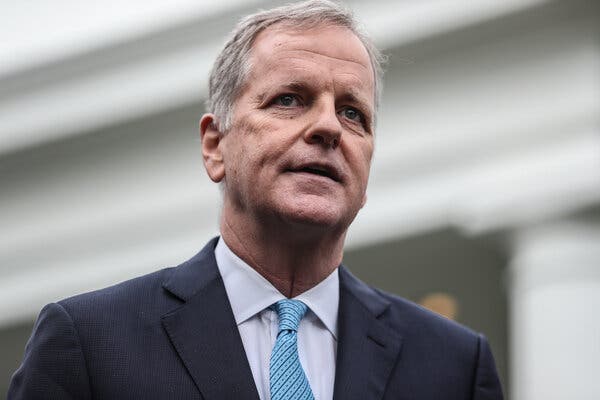
The American Airlines chief executive, Doug Parker, spoke to workers last week about his decision to publicly oppose restrictive voting legislation pending in Texas, saying that people of color feel “as though these laws are making it much harder for people like them to vote.”
Mr. Parker said in a meeting with employees that he wasn’t trying to take sides in a partisan dispute, but that for him, voting rights was “an equity issue,” according to a recording of the conversation obtained by View From the Wing, a travel industry blog.
American Airlines declined to comment on the recording.
The airline, which is based in Fort Worth, was among the first major companies to publicly oppose the voting legislation that Republicans were advancing in Texas. Just days after Georgia passed a voting law that would make it harder for some people to vote, the company came out against similar legislation pending in Texas, saying it was “strongly opposed to this bill and others like it.”
In the meeting with employees last week, Mr. Parker said he felt the company was going to have to weigh in on the issue. “I think there was virtually no chance we could stay out of it,” he said. “You have to take a stand on these things.”
He added that legislation that targets minority populations is bad for the economy, noting that when such laws pass, companies, sports leagues and entertainers sometimes take their business elsewhere.
“The more we divide ourselves, and the more divisive we become, the less likely it is that people are going to travel to states that take divisive stances, and that’s not good for us either,” Mr. Parker said.
Mr. Parker’s comments come as companies around the country are calibrating their opposition to restrictive voting laws being advanced by Republicans in almost every state. Hundreds of companies last week signed a letter opposing “discriminatory legislation.” Yet there is so far scant evidence that Republican lawmakers are reining in their efforts as a result of the corporate community’s outcry.





